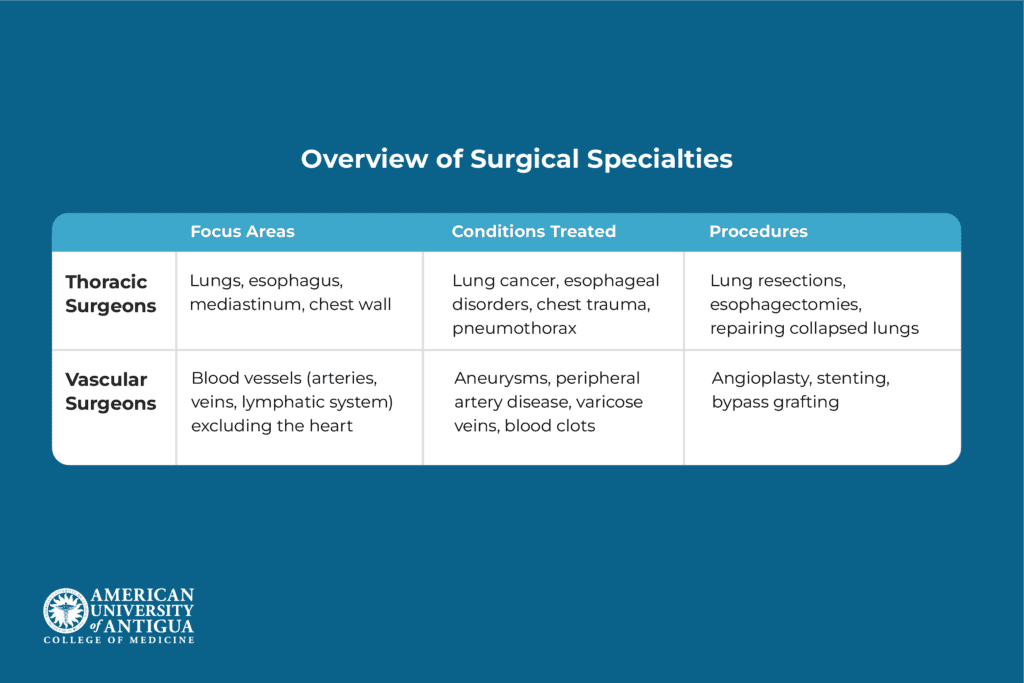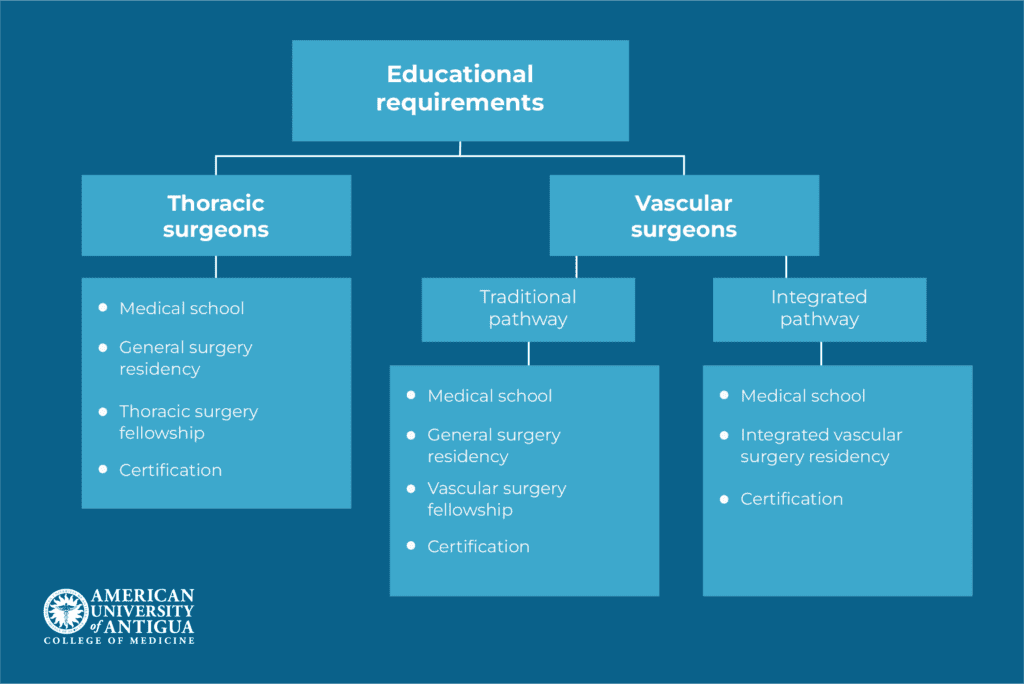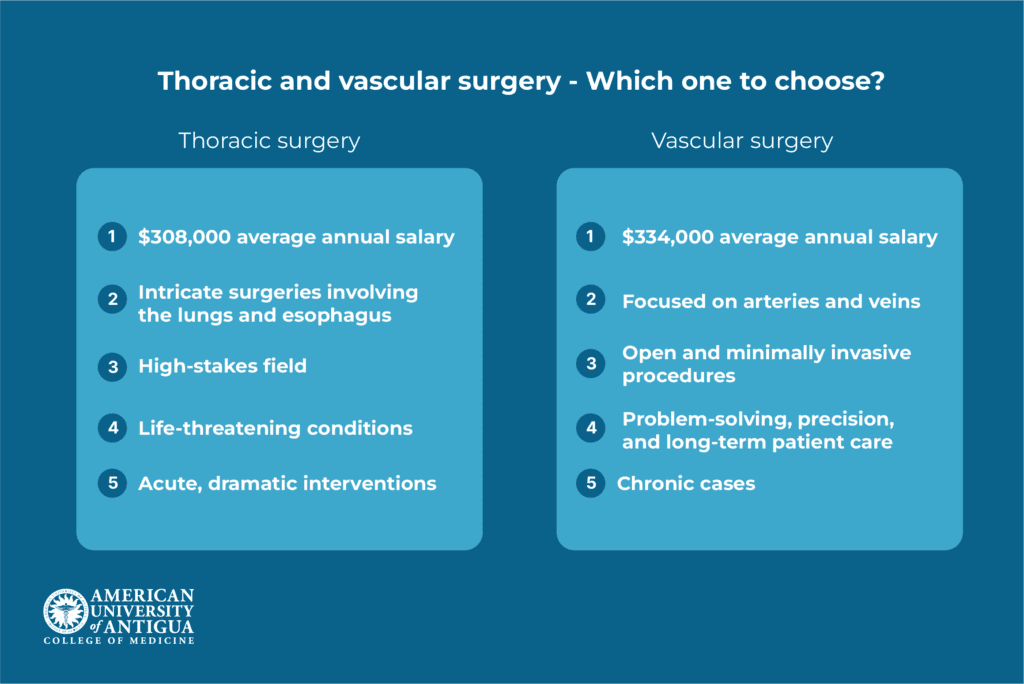Thoracic vs. Vascular Surgery: Procedures & Careers
Key Takeaways
- Thoracic surgeons specialize in the lungs, esophagus, and chest, while vascular surgeons focus on arteries, veins, and circulation.
- Both require extensive training, but thoracic surgery often involves cardiothoracic fellowships, while vascular surgery offers integrated and traditional pathways.
- The need for both specialists is rising due to aging populations and increased cardiovascular and pulmonary diseases, making them lucrative and impactful career choices.
Thoracic vs. vascular surgery – two specialties, both life-saving, yet vastly different in focus and approach. One deals with the lungs, esophagus, and chest, while the other keeps blood flowing smoothly through arteries and veins. From training paths to career outlooks, each offers unique challenges and rewards.
But how do they compare? What procedures define them? And which is the right fit for an aspiring surgeon? Understanding the nuances between these fields can help guide career decisions and highlight the impact these specialists make in medicine. Whether it’s mending damaged vessels or restoring lung function, both play a critical role.
✅ Request information on AUA's MD program TODAY!
Key Differences Between Thoracic and Vascular Surgery
Thoracic and vascular surgery may seem similar, but a closer look at their specialization, focus areas, common procedures, and training paths sets them apart. Each field carves its own niche in medicine, shaping surgeons with distinct expertise. Let’s take a closer look at the differences between thoracic vs vascular surgery.
Specialization & focus areas

While both thoracic and vascular surgeons operate within the body’s vital systems, their expertise lies in distinct areas.
Thoracic surgery
Thoracic surgery focuses on conditions affecting the lungs, esophagus, mediastinum (the space between the lungs), and chest wall. These surgeons treat lung cancer, esophageal disorders, chest trauma, and conditions like pneumothorax.
While thoracic surgery overlaps with cardiac surgery, the key difference is that thoracic surgeons primarily handle non-cardiac conditions. Instead of heart surgeries, they focus on procedures like lung resections, esophagectomies, and repairing collapsed lungs.
Their work plays a critical role in treating diseases that impact breathing and digestion, requiring a deep understanding of both surgical techniques and pulmonary medicine.
Vascular surgery
Vascular surgeons specialize in managing diseases of the blood vessels, including arteries, veins, and the lymphatic system, but excluding the heart. These surgeons treat conditions like aneurysms, peripheral artery disease, varicose veins, and blood clots.
Their expertise extends from minimally invasive endovascular procedures, such as angioplasty and stenting, to open surgeries like bypass grafting. Vascular surgeons work to ensure proper blood flow throughout the body, preventing complications like strokes and limb loss.
Their role is crucial in managing chronic conditions, such as diabetes-related circulation problems, and helping patients maintain overall vascular health.
Common procedures
Because of the different conditions treated, the procedures used by thoracic vs vascular surgeons also differ.
Thoracic surgery
Thoracic surgeons perform a variety of procedures to treat conditions affecting the lungs, esophagus, and chest cavity. These surgeries range from minimally invasive techniques to complex operations.
- Lung resection – This involves removing part or all of a lung to treat lung cancer, infections, or damaged tissue. The extent of removal depends on the severity of the condition.
- Esophagectomy – A major surgery that removes part or all of the esophagus, typically for esophageal cancer or severe damage from acid reflux. The remaining esophagus is then reconstructed using part of the stomach or intestine.
- Thoracic outlet syndrome surgery – This procedure relieves compression of nerves and blood vessels near the collarbone. It may involve removing a rib or adjusting muscles to restore normal circulation and nerve function.
- Pleural effusion drainage – A procedure to remove excess fluid around the lungs, improving breathing and reducing discomfort. It can be done through a needle (thoracentesis) or a more permanent catheter for ongoing drainage.
Vascular surgery
Vascular surgeons perform procedures to treat blood vessel disorders and improve circulation. These interventions help prevent serious complications like strokes and limb loss.
- Aneurysm repair – Used to treat weakened blood vessel walls that could rupture, this surgery may involve placing a stent or performing open repair to reinforce the artery.
- Carotid endarterectomy – This surgery removes plaque buildup in the carotid arteries to restore blood flow to the brain and reduce the risk of stroke.
- Bypass surgery – When arteries are blocked, a surgeon creates a new path using a graft (from another vessel or synthetic material) to restore circulation, often in the legs.
- Angioplasty – A minimally invasive procedure where a small balloon is inserted into a narrowed artery and inflated to improve blood flow, sometimes with a stent placement.
- Varicose vein treatment – These procedures, including laser therapy or vein stripping, remove or close damaged veins to improve circulation and reduce discomfort.
Education & training pathways

Becoming a thoracic or vascular surgeon requires extensive training, but the paths differ slightly. Both careers start with medical school, but specialization comes later through different residency and fellowship options.
Thoracic surgery
The journey to becoming a thoracic surgeon is long and highly specialized. After completing four years of medical school, aspiring surgeons enter a general surgery residency, which lasts 5-7 years. From there, they complete a thoracic surgery fellowship (2-3 years) to gain expertise in lung, esophageal, and chest surgeries.
Some programs offer an integrated cardiothoracic residency (6 years), allowing students to specialize sooner by skipping a separate general surgery residency.
After training, surgeons must pass the American Board of Thoracic Surgery (ABTS) certification exam to practice independently. This ensures they have the necessary skills to perform complex thoracic procedures safely.
Vascular surgery
Becoming a vascular surgeon can be achieved through the traditional route and the integrated route.
Traditional pathway
This route follows the standard surgery training model. After medical school (4 years), doctors complete a 5-year general surgery residency. Then, they undergo a 2-year vascular surgery fellowship to specialize in treating blood vessel disorders.
This path provides a strong foundation in general surgical skills before focusing on vascular techniques.
Integrated pathway
The integrated pathway allows students to specialize in vascular surgery earlier. After medical school (4 years), they enter a 5-6 year integrated vascular surgery residency, skipping a separate general surgery residency. This option streamlines training by focusing on vascular procedures from the start.
Graduates from both pathways must pass the American Board of Surgery (ABS) – Vascular Surgery certification exam before practicing.
Benefits of a Thoracic Surgery Career
A career in thoracic surgery offers high earning potential and strong job demand, especially with rising lung disease cases and an aging population. Surgeons in this field handle complex, life-saving procedures, making the work both financially and professionally rewarding. Advanced technology and research also keep the specialty innovative and evolving.
Salary
Thoracic surgeons are among the highest-paid surgical specialists, reflecting the extensive training and critical nature of their work. As of 2025, the average annual salary for a thoracic surgeon in the United States is approximately $308,000, equating to about $148.31 per hour.
Salaries can vary significantly based on factors such as geographic location, experience, and specific job responsibilities. For instance, in South Carolina, the average annual salary for a thoracic surgeon is $286,000, or $137.62 per hour. In Charlotte, North Carolina, the average is higher, at $300,885 annually, or $144.66 per hour.
Surgeons with more years of experience or those working in high-demand areas may command higher salaries. Conversely, entry-level positions or roles in less populated regions might offer lower compensation. Therefore, when considering a career in thoracic surgery, it’s essential to account for these factors, as they can significantly influence earning potential.
Job outlook
Thoracic surgery offers diverse specialization options, including oncologic surgery, which focuses on cancers of the chest organs, and transplant surgery, which involves heart and lung transplants. These subspecialties address complex conditions and offer many career opportunities.
The aging population and rising incidence of lung diseases contribute to an increasing demand for thoracic surgeons. In fact, there’s a 20% projected increase in demand for cardiothoracic surgeons by 2035. However, with approximately 900 expected retirements, a 31% shortfall is also anticipated.
These trends highlight the critical need for thoracic surgeons, particularly in specialized fields, to meet the evolving healthcare demands.
Benefits of a Vascular Surgery Career
Vascular surgery offers a dynamic career with strong demand, competitive salaries, and a mix of open and minimally invasive procedures. Surgeons build lasting patient relationships while treating life-threatening conditions, making it both financially rewarding and personally fulfilling in the ever-evolving field of medicine.
Salary
Vascular surgeons also benefit from lucrative salaries. Compared to thoracic surgeons, they earn an average of $334,000 yearly, surpassing many other medical specialties – thoracic surgeons included.
Similarly, their salaries are influenced by factors like experience, location, and practice setting. In Texas, for example, the average annual pay is slightly lower than the national average – around $321,000, or $154.44 per hour.
Moreover, factors such as years of experience, subspecialization, and the type of healthcare facility also play crucial roles in determining earning potential. Overall, vascular surgery remains a financially rewarding field, reflecting the specialized skills and critical nature of the work involved.
Job outlook
The aging population and increasing prevalence of vascular diseases, such as diabetes-related peripheral artery disease (PAD) and strokes, are driving a high demand for vascular surgeons. Projections indicate that approximately one-fifth of the global population will be over the age of 65 by 2030, with many exhibiting cardiovascular diseases and other age-related disorders.
This demographic shift contributes to the growing need for specialized vascular care. While the overall employment of physicians and surgeons is projected to grow 4% from 2023 to 2033, aligning with the average for all occupations, specific data for vascular surgeons suggest a more pronounced demand.
Recent assessments predict that shortages of vascular surgeons will decline through 2040, with the workforce size meeting demand by 2050.
How to Choose Between Thoracic and Vascular Surgery

Choosing between thoracic and vascular surgery is no small decision – it’s about finding the path that truly fits your skills, interests, and career goals. If you love the challenge of intricate surgeries involving the lungs, esophagus, or even heart transplants, thoracic surgery might be your calling. It’s a high-stakes field, often dealing with life-threatening conditions, but incredibly rewarding for those who thrive under pressure.
On the other hand, vascular surgery focuses on arteries and veins, offering a mix of open procedures and minimally invasive techniques. If you enjoy problem-solving, precision, and long-term patient care (sometimes managing conditions for life), this specialty could be the right fit. Plus, if you prefer a balance between surgery and endovascular interventions, vascular surgery provides that variety.
Consider your strengths: Do you have steady hands for delicate lung resections, or do you prefer tackling complex blood flow issues? Think about lifestyle, too—vascular surgeons often see chronic cases, while thoracic surgeons handle acute, sometimes dramatic interventions.
Ultimately, both careers are fulfilling and well-compensated. The best choice is the one that excites you the most. Spend time shadowing, talk to mentors, and trust your instincts – you’ll know where you belong.
Conclusion
Both thoracic and vascular surgery offer exciting, high-impact careers, each with its own challenges and rewards. Whether you’re drawn to the complexity of lung and heart procedures or the precision of vascular interventions, the key is choosing what aligns with your skills and passions. With a growing demand for specialists in both fields, the future looks promising.
If you’re ready to take the first step toward a surgical career, consider studying at the American University of Antigua (AUAMED), where you’ll gain the foundation needed to succeed. Explore their programs today and start your journey toward becoming a top surgeon!
Frequently Asked Questions (FAQs):
Can a general surgeon perform thoracic or vascular procedures?
General surgeons receive some training in thoracic and vascular procedures but typically handle only basic cases, like trauma-related chest injuries or emergency vascular repairs. Complex surgeries, such as lung resections or aneurysm repairs, require specialized training through fellowships in thoracic or vascular surgery.
Are there non-surgical career options for thoracic and vascular surgeons?
Yes! Many surgeons transition into roles in medical research, healthcare administration, consulting, or teaching. Some also work in medical device development, leveraging their expertise to improve surgical tools and techniques.
✅ Request information on AUA's MD program TODAY!